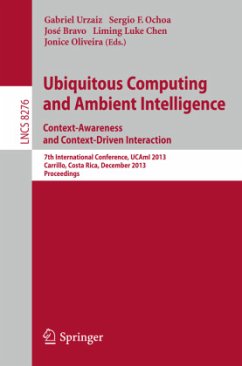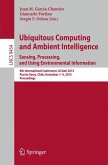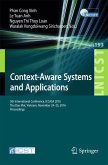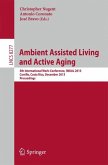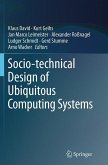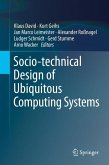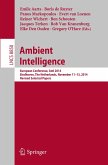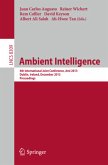Ubiquitous Computing and Ambient Intelligence: Context-Awareness and Context-Driven Interaction
7th International Conference, UCAmI 2013, Carrillo, Costa Rica, December 2-6, 2013, Proceedings
Herausgegeben:Urzaiz, Gabriel; Ochoa, Sergio F.; Bravo, Jose; Chen, Liming Luke; Oliveira, Jonice
Ubiquitous Computing and Ambient Intelligence: Context-Awareness and Context-Driven Interaction
7th International Conference, UCAmI 2013, Carrillo, Costa Rica, December 2-6, 2013, Proceedings
Herausgegeben:Urzaiz, Gabriel; Ochoa, Sergio F.; Bravo, Jose; Chen, Liming Luke; Oliveira, Jonice
- Broschiertes Buch
- Merkliste
- Auf die Merkliste
- Bewerten Bewerten
- Teilen
- Produkt teilen
- Produkterinnerung
- Produkterinnerung
This book constitutes the refereed proceedings of the 7th International Conference on Ubiquitous Computing and Ambient Intelligence, UCAmI 2013, held in Guanacaste, Costa Rica, in December 2013. The 46 research papers presented together with 8 papers of the workshop UrbAI 2013 were carefully reviewed and selected from numerous submissions. The papers are grouped in topical sections on human interaction in ambient intelligence, ICT instrumentation and middleware support for smart environments and objects, adding intelligence for environment adaption and key application domains for ambient intelligence.…mehr
Andere Kunden interessierten sich auch für
![Ubiquitous Computing and Ambient Intelligence. Sensing, Processing, and Using Environmental Information Ubiquitous Computing and Ambient Intelligence. Sensing, Processing, and Using Environmental Information]() Ubiquitous Computing and Ambient Intelligence. Sensing, Processing, and Using Environmental Information38,99 €
Ubiquitous Computing and Ambient Intelligence. Sensing, Processing, and Using Environmental Information38,99 €![Context-Aware Systems and Applications Context-Aware Systems and Applications]() Context-Aware Systems and Applications38,99 €
Context-Aware Systems and Applications38,99 €![Ambient Assisted Living and Active Aging Ambient Assisted Living and Active Aging]() Ambient Assisted Living and Active Aging38,99 €
Ambient Assisted Living and Active Aging38,99 €![Socio-technical Design of Ubiquitous Computing Systems Socio-technical Design of Ubiquitous Computing Systems]() Socio-technical Design of Ubiquitous Computing Systems38,99 €
Socio-technical Design of Ubiquitous Computing Systems38,99 €![Socio-technical Design of Ubiquitous Computing Systems Socio-technical Design of Ubiquitous Computing Systems]() Socio-technical Design of Ubiquitous Computing Systems38,99 €
Socio-technical Design of Ubiquitous Computing Systems38,99 €![Ambient Intelligence Ambient Intelligence]() Ambient Intelligence38,99 €
Ambient Intelligence38,99 €![Ambient Intelligence Ambient Intelligence]() Ambient Intelligence38,99 €
Ambient Intelligence38,99 €-
-
-
This book constitutes the refereed proceedings of the 7th International Conference on Ubiquitous Computing and Ambient Intelligence, UCAmI 2013, held in Guanacaste, Costa Rica, in December 2013. The 46 research papers presented together with 8 papers of the workshop UrbAI 2013 were carefully reviewed and selected from numerous submissions. The papers are grouped in topical sections on human interaction in ambient intelligence, ICT instrumentation and middleware support for smart environments and objects, adding intelligence for environment adaption and key application domains for ambient intelligence.
Produktdetails
- Produktdetails
- Lecture Notes in Computer Science 8276
- Verlag: Springer / Springer International Publishing / Springer, Berlin
- Artikelnr. des Verlages: 978-3-319-03175-0
- 2013
- Seitenzahl: 420
- Erscheinungstermin: 13. November 2013
- Englisch
- Abmessung: 235mm x 155mm x 23mm
- Gewicht: 634g
- ISBN-13: 9783319031750
- ISBN-10: 3319031759
- Artikelnr.: 39617638
- Herstellerkennzeichnung
- Springer-Verlag GmbH
- Tiergartenstr. 17
- 69121 Heidelberg
- ProductSafety@springernature.com
- Lecture Notes in Computer Science 8276
- Verlag: Springer / Springer International Publishing / Springer, Berlin
- Artikelnr. des Verlages: 978-3-319-03175-0
- 2013
- Seitenzahl: 420
- Erscheinungstermin: 13. November 2013
- Englisch
- Abmessung: 235mm x 155mm x 23mm
- Gewicht: 634g
- ISBN-13: 9783319031750
- ISBN-10: 3319031759
- Artikelnr.: 39617638
- Herstellerkennzeichnung
- Springer-Verlag GmbH
- Tiergartenstr. 17
- 69121 Heidelberg
- ProductSafety@springernature.com
Session 1: Human Interaction in Ambient Intelligence (1/2).-Context-Aware Energy Efficiency in Smart Buildings.- Magnetic-Field Feature Extraction for Indoor Location Estimation.- A Safe Kitchen for Cognitive Impaired People.- Breaking the Pattern: Study on Stereoscopic Web Perception.- Multiple Views for Supporting Lifelong, Highly Contextual and Ubiquitous Social Learning.- Boosting Dependable Ubiquitous Computing: A Case Study .- Context-Aware Self-adaptations: From Requirements Specification to Code Generation.- Intelligent Information System to Tracking Patients in Intensive Care Units.- Wide-Input Intelligent Environments for Industrial Facilities.- Citizen-Centric Linked Data Apps for Smart Cities.- Session 2: Human Interaction in Ambient Intelligence (2/2).-Pervasive User Interface Elements as Synthetic Networked Files.- Design Lessons from Deploying NFC Mobile Payments.- User, Context and Device Modeling for Adaptive User Interface Systems.- A Case of Use of Augmented Reality for Supporting Communication in Presentations.- Improving the Process for Developing Augmented Objects: An HCI Perspective.- Tangible Interfaces and Virtual Worlds: A New Environment for Inclusive Education.- Movement-Based and Tangible Interactions to Offer Body Awareness to Children with Autism.- Development Challenges in Web Apps for Public Displays.- Towards a Technology for Caregivers' Emotional Expression and Self-reflection.- A Sleep Monitoring Application for u-lifecare Using Accelerometer Sensor of Smartphone.- HARF: A Hierarchical Activity Recognition Framework Using Smartphone Sensors.- An Affective Inference Model Based on Facial Expression Analysis.- Probabilistic Situation Modeling from Ambient Sensors in a Health Condition Monitoring System.- Session 3: ICT Instrumentation and Middleware Support for Smart Environments and Objects.- Heterogeneous Device Networking for an AmI Environment.- Low Cost and Easy to Deploy Real Time Location System Based in RadioFrequency Identification.- METADEPCAS: Introducing Semantic RFID Data Management.- E-Flow: A Communication System for User Notification in Dynamic Evacuation Scenarios.- Subtle Interaction for a Non Intrusive Communication.- Characterizing Mobile Telephony Signals in Indoor Environments for Their Use in Fingerprinting-Based User Location.- Easing Communication Means Selection Using Context Information and Semantic Technologies.- Emergency Event Detection in Twitter Streams Based on Natural Language Processing.- Session 4: Adding Intelligence for Environment Adaptation.- AdapteR Interoperability ENgine (ARIEN): An approach of Interoperable CDSS for Ubiquitous Healthcare.- Understanding Movement and Interaction: An Ontology for Kinect-Based 3D Depth Sensors.- Ontological Goal Modelling for Proactive Assistive Living in Smart Environments.- A Generic Upper-Level Ontological Model for Context-Aware Applications within Smart Environments.- Session 5: Key Application Domains for Ambient Intelligence.- Improving University Quality of Services through Mobile Devices: The Case of the Technological University of Panama.- The Internet of Things to Support Urban Incident Responses.- Mobile System Surveillance for Vehicular Pollutants Emission, Based on Wi-Fi Ad-Hoc Network.- Leveraging the Model-Driven Architecture for Service Choreography in Ubiquitous Systems.- A Case Study for Validating a Prosumer Framework in Drug Traceability Scenarios.- Plate Location and Recognition Using Blob Analysis.- Applying Ambient Intelligence to Improve Public Road Transport.- Towards a Train-to-Ground and Intra-wagon Communications Solution Capable of Providing on Trip Customized Digital Services for Passengers.-Reducing Drivers' Distractions in Phone-Based Navigation Assistants Using Landmarks.- Pervasive System for the Local Tow-Truck Service.- Early Vehicle Accident Detection and Notification Based on Smartphone Technology.- Session 6: Workshop on Urban Applications and Infrastructures(UrbAI).- An Ontology-Driven Framework for Resource-Efficient Collaborative Sensing.- Enabling Citizen-Empowered Apps over Linked Data.- The Citizen Road Watcher - Identifying Roadway Surface Disruptions Based on Accelerometer Patterns.- Participatory Sensing for Improving Urban Mobility.- Risky Driving Detection through Urban Mobility Traces: A Preliminary Approach.- Ambient Urban Games for Reducing the Stress of Commuters Crossing the Mexico-US Border.- User Statistics and Traffic Analysis of Public Internet Access in Buses.- Sentiment Characterization of an Urban Environment via Twitter.
Session 1: Human Interaction in Ambient Intelligence (1/2).-Context-Aware Energy Efficiency in Smart Buildings.- Magnetic-Field Feature Extraction for Indoor Location Estimation.- A Safe Kitchen for Cognitive Impaired People.- Breaking the Pattern: Study on Stereoscopic Web Perception.- Multiple Views for Supporting Lifelong, Highly Contextual and Ubiquitous Social Learning.- Boosting Dependable Ubiquitous Computing: A Case Study .- Context-Aware Self-adaptations: From Requirements Specification to Code Generation.- Intelligent Information System to Tracking Patients in Intensive Care Units.- Wide-Input Intelligent Environments for Industrial Facilities.- Citizen-Centric Linked Data Apps for Smart Cities.- Session 2: Human Interaction in Ambient Intelligence (2/2).-Pervasive User Interface Elements as Synthetic Networked Files.- Design Lessons from Deploying NFC Mobile Payments.- User, Context and Device Modeling for Adaptive User Interface Systems.- A Case of Use of Augmented Reality for Supporting Communication in Presentations.- Improving the Process for Developing Augmented Objects: An HCI Perspective.- Tangible Interfaces and Virtual Worlds: A New Environment for Inclusive Education.- Movement-Based and Tangible Interactions to Offer Body Awareness to Children with Autism.- Development Challenges in Web Apps for Public Displays.- Towards a Technology for Caregivers' Emotional Expression and Self-reflection.- A Sleep Monitoring Application for u-lifecare Using Accelerometer Sensor of Smartphone.- HARF: A Hierarchical Activity Recognition Framework Using Smartphone Sensors.- An Affective Inference Model Based on Facial Expression Analysis.- Probabilistic Situation Modeling from Ambient Sensors in a Health Condition Monitoring System.- Session 3: ICT Instrumentation and Middleware Support for Smart Environments and Objects.- Heterogeneous Device Networking for an AmI Environment.- Low Cost and Easy to Deploy Real Time Location System Based in RadioFrequency Identification.- METADEPCAS: Introducing Semantic RFID Data Management.- E-Flow: A Communication System for User Notification in Dynamic Evacuation Scenarios.- Subtle Interaction for a Non Intrusive Communication.- Characterizing Mobile Telephony Signals in Indoor Environments for Their Use in Fingerprinting-Based User Location.- Easing Communication Means Selection Using Context Information and Semantic Technologies.- Emergency Event Detection in Twitter Streams Based on Natural Language Processing.- Session 4: Adding Intelligence for Environment Adaptation.- AdapteR Interoperability ENgine (ARIEN): An approach of Interoperable CDSS for Ubiquitous Healthcare.- Understanding Movement and Interaction: An Ontology for Kinect-Based 3D Depth Sensors.- Ontological Goal Modelling for Proactive Assistive Living in Smart Environments.- A Generic Upper-Level Ontological Model for Context-Aware Applications within Smart Environments.- Session 5: Key Application Domains for Ambient Intelligence.- Improving University Quality of Services through Mobile Devices: The Case of the Technological University of Panama.- The Internet of Things to Support Urban Incident Responses.- Mobile System Surveillance for Vehicular Pollutants Emission, Based on Wi-Fi Ad-Hoc Network.- Leveraging the Model-Driven Architecture for Service Choreography in Ubiquitous Systems.- A Case Study for Validating a Prosumer Framework in Drug Traceability Scenarios.- Plate Location and Recognition Using Blob Analysis.- Applying Ambient Intelligence to Improve Public Road Transport.- Towards a Train-to-Ground and Intra-wagon Communications Solution Capable of Providing on Trip Customized Digital Services for Passengers.-Reducing Drivers' Distractions in Phone-Based Navigation Assistants Using Landmarks.- Pervasive System for the Local Tow-Truck Service.- Early Vehicle Accident Detection and Notification Based on Smartphone Technology.- Session 6: Workshop on Urban Applications and Infrastructures(UrbAI).- An Ontology-Driven Framework for Resource-Efficient Collaborative Sensing.- Enabling Citizen-Empowered Apps over Linked Data.- The Citizen Road Watcher - Identifying Roadway Surface Disruptions Based on Accelerometer Patterns.- Participatory Sensing for Improving Urban Mobility.- Risky Driving Detection through Urban Mobility Traces: A Preliminary Approach.- Ambient Urban Games for Reducing the Stress of Commuters Crossing the Mexico-US Border.- User Statistics and Traffic Analysis of Public Internet Access in Buses.- Sentiment Characterization of an Urban Environment via Twitter.

